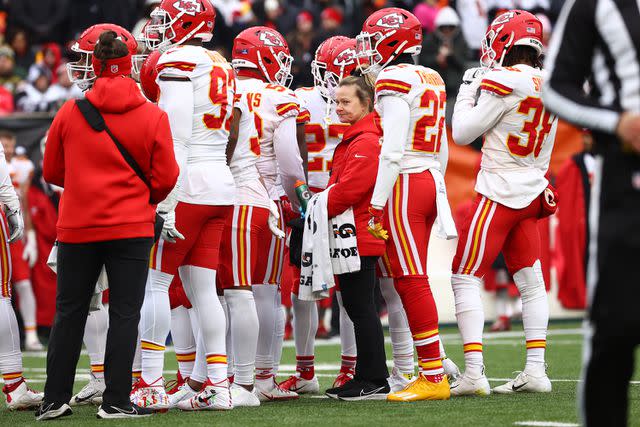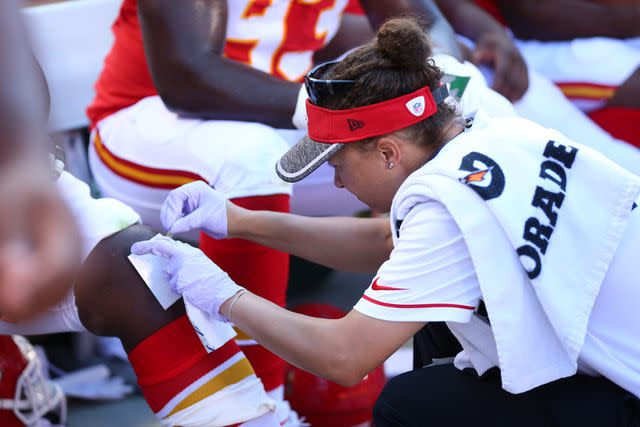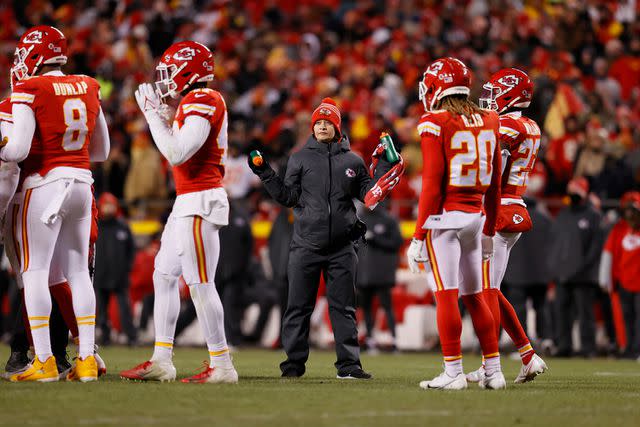'Save Lives and Get Guys to the Super Bowl:' Meet the Women Doing Just That as the Chiefs' Athletic Trainers
"In helping other people live out their dreams, I'm literally living out mine every day too," says assistant athletic trainer Julie Frymyer

Courtesy of Chiefs.com
Kansas City Chiefs assistant athletic trainer Tiffany MortonIf you see someone running onto the field Super Bowl Sunday when a player gets injured, or racing around on the sidelines, that’s probably an athletic trainer, says Kansas City Chiefs assistant athletic trainer Tiffany Morton.
“We are there for when the emergency happens, not as a reaction to the emergency,” Morton says. “If somebody goes down on the field, we run out. There’s not a 9-1-1 call that says, ‘Hey, somebody’s down, get here as fast as you can.”
Morton interned with the Chiefs during the 2015 season, and joined the staff in 2016. This is her fourth Super Bowl as an assistant athletic trainer for the team.
“I haven't even finished celebrating the last one, and we're here back again” Morton, 37, told PEOPLE from Las Vegas, ahead of the Chiefs' game against the San Francisco 49ers on Sunday. “You’re just overwhelmed: Overwhelmed with excitement, overwhelmed with emotion, overwhelmed with pride for the guys that have worked really hard and the team that's been pushing for that moment for years.”

Courtesy of Chiefs.com
Kansas City Chiefs Assistant Athletic Trainer Julie Frymyer during an Chiefs football gameJoining her on the field will be assistant athletic trainer Julie Frymyer, 40, who is also going into her fourth Super Bowl with the Chiefs.
Their job is to be on call to the players 24-7, working with players before and after practices, as well as during their grueling schedule of media appearances and team meetings this week, to help them be in the best possible shape when they hit the field Sunday.
And in preparation for the biggest week of the team's year, the athletic trainers have been working overtime packing (sending 12 to 15 trunks of gear ahead of the players) and preparing the team for the big game.
"Essentially, if it's not bolted down in our athletic training room, we're packing it up and bringing it with us. We bring all of our treatment modalities, we bring tape, we bring all of our braces. If there's something we think you could possibly need, we're bringing it!" Frymyer tells PEOPLE, noting that they spend the week leading up to the game grabbing the players whenever they can get a minute (and wherever they are at that point in the day) to either work with them on existing injuries or working out general "aches and pains."
Related: Everything to Know About the 2024 Super Bowl

Courtesy of Chiefs.com
Julie Frymyer during training campWhen it finally gets to game day, Frymyer says, the training and equipment team will go early in the morning to the stadium to get everything set up. Then when the team arrives, about three hours before kickoff, the training staff goes into overdrive to make sure everyone is in the best physical shape they can be.
Once the game starts, their most critical role is to run onto the field, along with a physician, if a player is injured during play, As Morton points out, athletic trainers "absolutely save lives," noting the rapid response to the Buffalo Bills' Damar Hamlin's on-field cardiac arrest; he recovered well enough to return to the team.
(Both women are passionate about the need for athletic trainers at sporting events at all levels; says Morton, "Having somebody there who knows exactly how to recognize an emergency is essential to sports medicine and basic care ... If you can't afford an athletic trainer, then you cannot afford a sports program, because it's that essential.")
Related: How to Watch the 2024 Super Bowl, Including Where to Stream

Courtesy of Chiefs.com
Tiffany Morton working on the sidelines during a Chiefs gameIt's not just those dramatic, play-stopping moments where athletic trainers are essential: They're also on the sidelines making sure players stay hydrated and fueled, fixing dislocated fingers or cleaning blood off jerseys.
If a player is injured but able to walk off the field (thus not stopping the play clock), the trainers also must quickly triage injuries and communicate the player's condition with coaches, to help them determine if and when players are ready to get back into the game, depending on the condition of the sprain, strain, cramp, concussion or fracture.

Courtesy of Chiefs.com
Tiffany Morton during a game against the Cincinnati BengalsBefore every game, Morton says the same prayer.
“It’s always: Give me insight and the strength to make the right decision quickly,” she says. “You've got to make a decision that pushes you into action. There's not time to be indecisive.”
Morton hopes no one gets injured on the field this weekend, but if something happens, she and her colleagues will be ready to help.
“I'm really hoping that I'm going to be doing a lot more cheering and less running around because the guys are just so lucky and blessed that there are no injuries," she says hopefully. "But if not, if you see one of us running onto the field or you see somebody just crazy running on the sideline, know that you're probably witnessing an athletic trainer in their full action."

Courtesy of Chiefs.com
Julie Frymyer helping cool off a player during training campFor her work behind the scenes after Patrick Mahomes' ankle injury last year, Frymyer was dubbed "the woman who rescued Patrick Mahomes' season" by the Wall Street Journal, a distinction she calls "a little bit dramatic" — but which really underscores the key working relationship trainers have with the athletes and their all-important knees, shoulders and more.
"My job is to help [players like Mahomes] be ready to go out there able to perform — not only for himself, but for his teammates," she says. "And then to be able to stand up there when [he won] not only the MVP for himself, but the Lombardi for all of the team and all of Kansas City, I really don't know how to put into words how that feels to be able to help somebody do that."
“This is what they've hoped and dreamed about since they were kids,” Frymyer adds of players she works with. “What is there not to be excited about? The players are literally living out their childhood dreams. Getting to see them soak up all of that is one of my favorite parts. And in helping other people live out their dreams, I'm literally living out mine every day too."
For more People news, make sure to sign up for our newsletter!
Read the original article on People.


